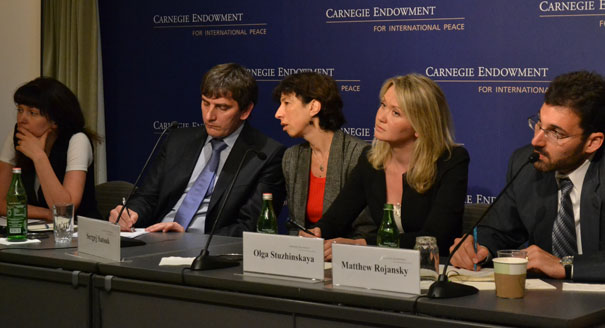Registration
You will receive an email confirming your registration.
IMGXYZ3822IMGZYXOne year ago, the Belarus policy community lost one of its brightest stars, Vitali Silitski, director of the Belarusian Institute for Strategic Studies (BISS). To honor his memory, Carnegie hosted a discussion of the current situation in Belarus with Tatiana Kouzina of BISS, Sergej Satsuk of Ezhednevnik, the first Belarusian electronic newspaper, and Olga Stuzhinskaya of the Office for a Democratic Belarus, a Brussels-based NGO. Balazs Jarabik, of Kiev-based office of Pact, Inc., introduced the panel. Carnegie’s Matthew Rojansky moderated.
Travel for the Belarusian speakers was supported by USAID through Pact, Inc.
Honoring Vitali Silitski
Rodger Potocki of the National Endowment for Democracy provided the opening remarks in memory of Vitali Silitski. Potocki discussed several overarching themes visible in Silitski’s writings and ideas:
- Inside and Not Outside: Silitski advocated for funding for groups inside of Belarus, “not to the diaspora in the West.”
- A Unified Opposition: Silitski advocated against allowing individual egos to divide the political opposition, arguing that a strong opposition was a united opposition.
- Political NGOs: Silitski believed that non-governmental organizations need to be primarily political to empower individuals.
- Be Engaged: “Vitali believed in talking, talking to Russia and the West,” said Potocki, emphasizing the importance of international dialogue for Belarus.
- Profound Skepticism of Russia: “Vitali wrote over and over about the negative influence of Russia in terms of democratic values,” said Potocki. Silitski did not believe that positive democratic change could come to Belarus from Russia, he explained.
- Democracy Promotion as a Noble Act: Vitali viewed democracy promotion not as subversive, but as a welcome, noble act, added Potocki.
General Overview of the Political Situation in Belarus
Kouzina examined some concepts helpful for understanding the present-day situation in Belarus.
- Preemptive Authoritarianism: Kouzina described Silitski’s concept of preemptive authoritarianism as an effort by the regime to suppress any emerging oppositional forces by dealing with political challenges well in advance. In Belarus, this takes two chief forms: tactical prevention, such as pressure on opposition politicians, independent journalists, and human rights defenders, and institutional prevention, such as legal amendments on mass events and recent bill to penalize “illegal sociological surveys.”
- Cooperation Between Regimes: Authoritarian regimes tend to help each other economically, added Kouzina. An example of this is the cooperation between Russia and Belarus, she added.
- Social Contract: According to a 2008-2009 study, only 4 percent of the population in Belarus is ready to participate in protest actions, said Kouzina. The authorities encourage this reluctance by providing benefits to different social groups to guarantee their electoral loyalty. Lately, however, the Belarus government has stopped buying electoral loyalty of the large groups of citizens and began moving towards the path of oligarchic authoritarianism, said Kouzina.
- Ahead of Parliamentary Elections: There are currently twelve political prisoners, said Kouzina. The regime has also created a list of opposition members and restricted them from leaving the country.
- Pro-Russian Orientation: There has been a notable decline in support for the EU in Belarus, said Kouzina. In the past year, popular support for Russia has increased by more than 15 percent. Most likely, these attitudes were influenced by the integration package offered by Russia, including the renovation of economic support in exchange for Belarusian adhesion to the Eurasian Union project, explained Kouzina.
The State of Belarusian Economy
- Russia’s Economic Influence: Russian crude oil is sent, tax free, to Belarus for “domestic consumption” but then re-exported, resulting in a profit of around $10 billion over three years, explained Satsuk. Currently, domestic oil prices are lower in Belarus than in Russia, from where the oil is exported, he added. Belarus also benefits from cheap natural gas, earning about $5 billion over three years, added Satsuk. Overall, Russian investment in Belarus over the next three years will reach $28 billion, dwarfing the $5 billion provided by Western international financial institutions, said Satsuk. This gives Russia significant influence in Belarus.
- External Debt: Over the past five years, the country’s external debt has grown threefold compared to GDP, said Satsuk. If Russia were to cut its financial assistance, Belarus would have to default on its debt, he added.
- Customs Union: Belarusian expectations that the customs union would dramatically increase their market for exports have not come to fruition, said Satsuk. Exports to Russia have increased by around 75 percent, whereas Russian exports to Belarus have increased threefold.
- Corruption: Corruption is rampant in Belarus, and with Russian business proving increasingly dominant in Belarus, corrupt Belarus officials will increasingly look for “conglomerate” opportunities with Russian capital and financial groups associated with Putin, said Satsuk.
Development Trends in Belarus’s Civil Society
- Reform: A March 2012 poll conducted by BISS demonstrates that the majority of people in Belarus desire reform and change, said Stuzhinskaya. However, she added, there are weak domestic forces to push reforms through.
- Recommendations: Domestic civil society needs long-term investment to aid domestic forces of change, said Stuzhinskaya. Efforts need to be concentrated on projects that will help to keep people in the country, encourage them to work on changing their own environment, and make them responsible for its future, she concluded.
